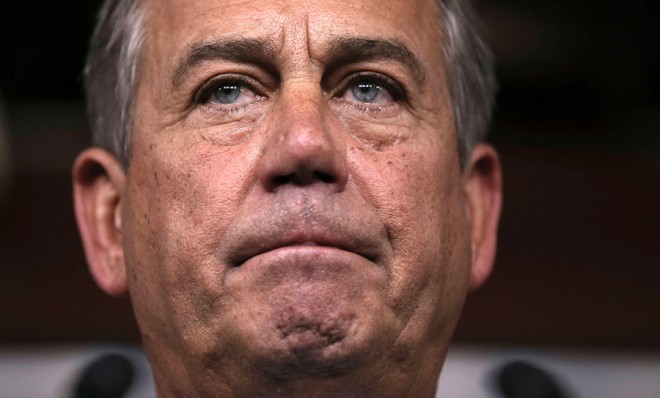John Boehner's dilemma: Tea Party uprising or Latino uprising?
Eventually, the Republican Party will face one or the other

A free daily email with the biggest news stories of the day – and the best features from TheWeek.com
You are now subscribed
Your newsletter sign-up was successful
On immigration, Speaker John Boehner is caught between two unpleasant possibilities: A Tea Party uprising or a Latino uprising. Eventually, he's going to have to choose which presents a bigger risk to his party.
So far, all of his rhetoric and body language suggests he is trying to protect his House Republican caucus from a Tea Party uprising that would take out incumbents in Republican primaries, and perhaps himself from a challenge to his speakership.
Even though the Senate passed landmark immigration reform with a supermajority of 68 votes, Speaker Boehner is refusing to bring the Senate bill to the House floor. He is insisting the House pass its own legislation with "majority support of Republicans," a needless standard designed to produce a far more right-wing bill than the Democratic-led Senate can tolerate, increasing the chances of a deadlocked House-Senate negotiation.
The Week
Escape your echo chamber. Get the facts behind the news, plus analysis from multiple perspectives.

Sign up for The Week's Free Newsletters
From our morning news briefing to a weekly Good News Newsletter, get the best of The Week delivered directly to your inbox.
From our morning news briefing to a weekly Good News Newsletter, get the best of The Week delivered directly to your inbox.
If it even gets that far. Considering how House Republicans recently failed to come together to pass a farm bill, it's not a given the House can pass any immigration bill with Republican votes alone.
Failure to pass a final bill suits Tea Party Republicans just fine. But if Boehner buries a widely supported bipartisan Senate bill, the uprising he faces may be far worse.
On Sunday, Sen. Chuck Schumer (D-N.Y.) told CNN, "This has the potential of becoming the next major civil rights movement. I could envision in the late summer or early fall if Boehner tries to bottle the bill up or put something in without a path to citizenship … I could see a million people on the Mall in Washington."
This is not idle musing. This has already happened.
A free daily email with the biggest news stories of the day – and the best features from TheWeek.com
In December 2005, the House passed legislation that would turn undocumented workers into felons. A wave of mass protests by Latinos swept the country the following spring, lasting for three months. Half a million poured into the streets of Los Angeles, and 400,000 marched in downtown Chicago. Seeing the strength of the Latino vote, the Senate quickly backed off of the House approach and in May 2006 passed an immigration bill providing a pathway to citizenship for the undocumented.
Neither the House nor Senate bills became law. But back in 2006, with conservative Republicans controlling both chambers, gridlock was a win for the protesters. Today, with immigration advocates so close to winning historic reform, gridlock would be a devastating blow.
And if the highest-ranking Republican in the country was the clear roadblock, the Republican Party in general would be on the receiving end of visceral hatred, most likely voiced once again in the streets.
A wave of protests targeting Republicans that matched or surpassed the level of street heat generated in 2006 would be devastating to the Republican Party's attempts to win back the Latino votes that proved decisive to Barack Obama's 2008 and 2012 victories. With the Latino share of the electorate continuing to rise — most ominously for Republicans, in their lone bastion of strength, the South — killing immigration reform could fast-track a demographic disaster that would condemn Republicans to minority status for a generation.
In the end, Boehner will have to decide which uprising he wants to face least: A Tea Party uprising that could spell personal defeats for himself and his friends, or a Latino uprising that could spell the end of the Republican Party.
If he takes the long view, he will recognize that his speakership won't last for long if his party crumbles all around him.
Bill Scher is the executive editor of LiberalOasis.com and the online campaign manager at Campaign for America's Future. He is the author of Wait! Don't Move To Canada!: A Stay-and-Fight Strategy to Win Back America, a regular contributor to Bloggingheads.tv and host of the LiberalOasis Radio Show weekly podcast.
-
 What to watch out for at the Winter Olympics
What to watch out for at the Winter OlympicsThe Explainer Family dynasties, Ice agents and unlikely heroes are expected at the tournament
-
 Properties of the week: houses near spectacular coastal walks
Properties of the week: houses near spectacular coastal walksThe Week Recommends Featuring homes in Cornwall, Devon and Northumberland
-
 Will Beatrice and Eugenie be dragged into the Epstein scandal?
Will Beatrice and Eugenie be dragged into the Epstein scandal?Talking Point The latest slew of embarrassing emails from Fergie to the notorious sex offender have put her daughters in a deeply uncomfortable position
-
 The billionaires’ wealth tax: a catastrophe for California?
The billionaires’ wealth tax: a catastrophe for California?Talking Point Peter Thiel and Larry Page preparing to change state residency
-
 Bari Weiss’ ‘60 Minutes’ scandal is about more than one report
Bari Weiss’ ‘60 Minutes’ scandal is about more than one reportIN THE SPOTLIGHT By blocking an approved segment on a controversial prison holding US deportees in El Salvador, the editor-in-chief of CBS News has become the main story
-
 Has Zohran Mamdani shown the Democrats how to win again?
Has Zohran Mamdani shown the Democrats how to win again?Today’s Big Question New York City mayoral election touted as victory for left-wing populists but moderate centrist wins elsewhere present more complex path for Democratic Party
-
 Millions turn out for anti-Trump ‘No Kings’ rallies
Millions turn out for anti-Trump ‘No Kings’ ralliesSpeed Read An estimated 7 million people participated, 2 million more than at the first ‘No Kings’ protest in June
-
 Ghislaine Maxwell: angling for a Trump pardon
Ghislaine Maxwell: angling for a Trump pardonTalking Point Convicted sex trafficker's testimony could shed new light on president's links to Jeffrey Epstein
-
 The last words and final moments of 40 presidents
The last words and final moments of 40 presidentsThe Explainer Some are eloquent quotes worthy of the holders of the highest office in the nation, and others... aren't
-
 The JFK files: the truth at last?
The JFK files: the truth at last?In The Spotlight More than 64,000 previously classified documents relating the 1963 assassination of John F. Kennedy have been released by the Trump administration
-
 'Seriously, not literally': how should the world take Donald Trump?
'Seriously, not literally': how should the world take Donald Trump?Today's big question White House rhetoric and reality look likely to become increasingly blurred